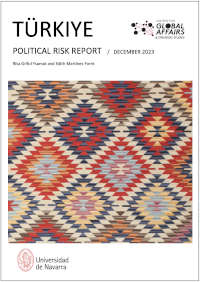 Download the document
Download the document
executive summary
Regarding the economic outlook, the report noted that Turkey is likely to experience an economic slowdown in the near term. GDP growth is expected to decline to 3% in 2024. Inflation is expected to continue rising in the near term, reaching 62.5% in 2024. The appreciation of the Turkish lira will be at the center of the Central Bank of Turkey’s monetary policy, as it is important in making lira income attractive to foreign investors. However, devaluation is expected to continue in the near term, reaching 38 Turkish liras per US dollar by the fourth quarter of 2024. The Turkish government is likely to encourage FDI in the energy, infrastructure, and industrial sectors. Furthermore, exports are expected to increase, and the current account deficit will shrink to -3% by 2024.
Regarding the energy and infrastructure outlook, the report identifies investment areas in Turkey that will generate short-, medium- and long-term returns. In the short term, coal, wind and hydroelectric power are expected to increase to compensate for reduced natural gas imports. In the medium and long term, gas, oil and nuclear energy are expected to become the main sources of domestic production. Furthermore, Turkey is likely to pursue the comparative advantages of its geographical location through the development of infrastructure such as natural gas pipelines and position itself as a regional energy hub.
The political and social outlook identifies political and social destabilizing factors that could negatively affect the country’s economic performance. The report concludes that President Erdogan’s influence over the judiciary, military, parliament, media, and private sector through corruption will continue to generate political and social discontent in the short and medium term. Weak social integration and the hostile attitude of Turks towards Syrian refugees will continue to fuel social divisions. Finally, the continuation of identity politics that creates marginalization of religious and ethnic minorities (including Kurds) could generate social unrest in the short and medium term. However, the continuation of the government’s political and social positions may depend on the outcome of local elections in March 2024.


